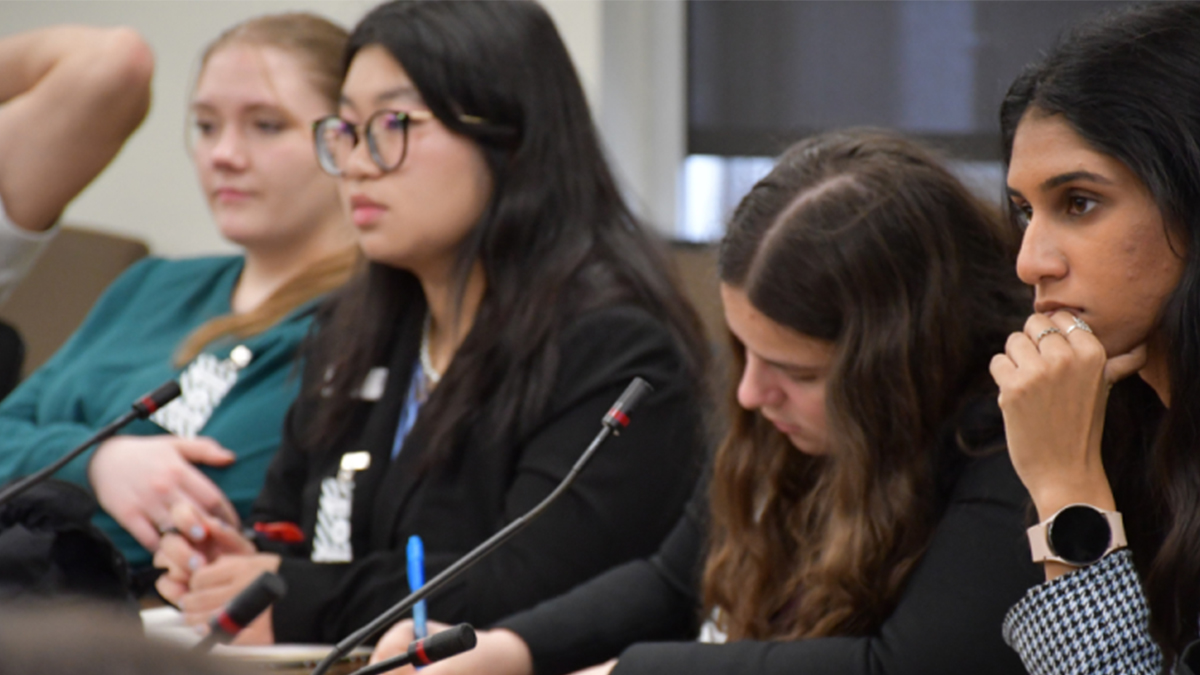‘Historic day’ marks dedication of new building names
Separate ceremonies on May 13 honored the legacies of Henry Owl and Hortense McClinton and celebrated adding diversity to Carolina’s landscape.
The ceremonies and sentiments were similar when Carolina dedicated two campus buildings with the names of two groundbreaking Tar Heels on May 13. But in keeping with what the names Henry Owl and Hortense McClinton represent, the dedications also celebrated the diversity of the honorees and their cultures.
At the first event, the dedication of the Henry Owl Building was first announced in Cherokee and the family received gifts of a handwoven basket and bundles of tobacco and sage. A Haliwa-Saponi attendee expressed her respect for Owl, the first American Indian to enroll at the University, with a trilling honor call.
At the dedication of McClinton Residence Hall, members of the Delta Sigma Theta sorority showed their support for their oldest living member by dressing in their signature crimson and cream. “Way to go, cuz!” shouted a member of McClinton’s extended family, who drove all the way from Oklahoma to attend the event.
Although originally intended to be celebrated at each building’s site, the dedications moved inside because of the threat of rain. But nearly 300 well-wishers crowded into the Frank Porter Graham Student Union auditorium, some staying for both ceremonies.
“Welcome to a historic day,” Chancellor Kevin M. Guskiewicz told the crowd as the ceremonies got underway to honor two groundbreaking Tar Heels.
Henry Owl
Owl (1896-1980) was the first American Indian to enroll at the University, as a graduate student in history in 1928. The naming committee that nominated Owl cited these achievements: Authored a study of Cherokee history, told from a Cherokee perspective, that challenged the racist myths of white settler colonialism; fought courageously for Cherokee Indians’ civil rights; served as an educator in Indian reservation schools and as a counselor to Indian veterans of World War II.
During the ceremony for the Henry Owl Building, his daughter, Gladys Cardiff of Seattle, Washington, received a bound copy of Owl’s thesis, “The Eastern Band of Cherokee Indians Before and After the Removal.” Bound copies will also be in the chancellor’s and provost’s offices and the American Indian Center.
Owl wrote the thesis to counter the racist myths that “befogged the underlying facts” of history. The chancellor said that line from the thesis spoke to him.
“At times, there’s been a fog around incredible, inspirational and underrepresented voices in our University’s history. And our goal today is to shine a light through that fog and illuminate more of the people who have made our University the place it is today,” Guskiewicz said.
In her remarks, Owl’s daughter spoke about her father’s family’s respect for education and gratitude for the “high and conspicuous honor” of the naming of the building for him. But she echoed the theme of the need for a broader telling of history.
“The significance of today goes far beyond any one name,” Cardiff said. “History is all about who speaks, who gets to speak and who does not.”
Hortense McClinton
McClinton was the first Black professor hired at Carolina, accepting an appointment with the UNC School of Social Work in 1966 and retiring in 1984. The committee that nominated her for the honor pointed out that McClinton “overcame the obstacles of a Jim Crow society and distinguished herself as a pioneer in desegregating the social work profession.” She was also “lauded nationally for teaching the knowledge and modeling the skills that prepare social workers to practice ‘without racial and cultural basis,’” the committee wrote.
“I just never expected this ever,” said the 103-year-old honoree, who traveled from her home in Silver Spring, Maryland, for the dedication of the McClinton Residence Hall. She received a standing ovation from the audience when she appeared on stage in her bright red pantsuit, pushing a walker.
In her remarks, Dean Ramona Denby-Brinson of the School of Social Work talked about McClinton’s legacy and announced the school’s establishment of a scholarship in her honor. The Hortense McClinton Legacy Scholarship will help students who mirror her values of community building, public service and support for marginalized individuals to graduate with limited or no college debt.
“Because of Mrs. McClinton, I’m here,” Denby-Brinson said. “May all of us who walk by the building remember that a social worker blazed a trail for the rest of us and she has created a more equitable world.”
McClinton talked about developing a course about racism that she taught across the state, even though “I didn’t want to be known as that kind of teacher.”
Guskiewicz referenced that course on racism and how McClinton had developed the course because “if you’ve been taught a certain thing all your life, you have to learn to know something different.”
“Our University has a history and a campus landscape that has often excluded important voices. And today we’re taking one step forward to learn and teach something different,” he said. “We are on a journey as a campus to be more inclusive and welcoming. We are not done yet.”
See the renaming announcement storyfor information on the University’s broader reconsideration of the names on its buildings.




